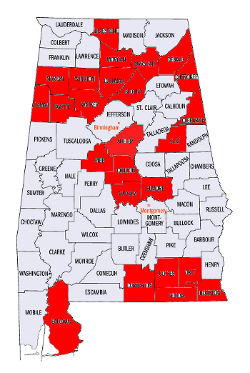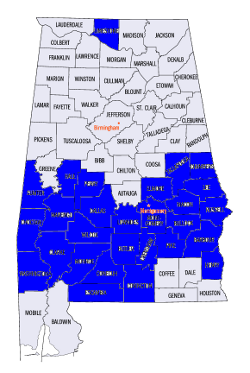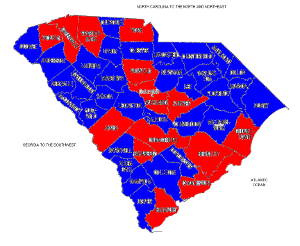In this diary I plan on compiling a list of competitive House races that, eventually, I will change into a ranking system similar to the one SSP uses. I am going to include any races I think have even the slightest potential to be competitive, and will narrow the list down later. Some races have competitive primaries, I have chosen the person I perceive to be the front runner. If I leave any races out, please let me know in the comments. Thanks!
AL-02 Bobby Bright (D-inc) vs Martha Roby (R) – Montgomery City Councilwoman
AL-03 Mike Rogers (R-inc) vs Josh Segall (D) – Attorney , ’08 Candidate
AL-05 Parker Griffith (D-inc) vs Mo Brooks (R) – Madison County Commissioner
AK-AL Don Young (R-inc) vs Harry Crawford (D) – State Representative
AZ-01 Ann Kirkpatrick (D-inc) vs Rusty Bowers (R) – Ex State Senator
AZ-05 Harry Mitchell (D-inc) vs David Schweikert (R) – Maricopa County Treasurer
AR-02 Vic Snyder (D-inc) vs Tim Griffin (R) – Ex US Attorney
CA-03 Dan Lungren (R-inc) vs Gary Davis (D) – Elk Grove City Councilman
CA-04 Tom McClintock (R-inc) vs Charlie Brown (D) – Ex USAF Officer, 06/08 Candidate
CA-11 Jerry McNerney (D-inc) vs Tony Amador (R) Ex US Attorney
CA-18 Dennis Cardoza (D-inc) vs Mike Berryhill (R) Ex Ceres School Board Member
CA-26 David Dreier (R-inc) vs Russ Warner (D) – 06/08 Candidate
CA-44 Ken Calvert (R-inc) vs Bill Hedrick (D) – Corona/Norco School Board President
CA-45 Mary Bono Mack (R-inc) vs Steve Pougnet (D) – Palm Springs Mayor
CA-47 Loretta Sanchez (D-inc) vs Van Tran (R) – State Assemblyman
CA-48 John Campbell (R-inc) vs Beth Krom (D) – Irvine City Councilwoman
CA-50 Brian Bilbray (R-inc) vs Francine Busby (D) – Ex Cardiff School Board Member
CO-03 John Salazar (D-inc) vs Martin Beeson (R) – District Attorney
CO-04 Betsy Markey (D-inc) vs Cory Gardner (R) – State Representative
CT-04 Jim Himes (D-inc) vs Dan Debicella (R) – State Senator
DE-AL (Open) no announced R vs John Carney (D) – Ex Lt. Governor
FL-10 Bill Young (R-inc) vs Charlie Justice (D) – State Senator
FL-12 (Open) Randy Wilkinson (R) – Polk County Commissioner vs Lori Edwards (D) – Polk County Elections Supervisor
FL-13 Vern Buchanan (R-inc) vs James Golden (D) – Ex Bradenton City Councilman
FL-16 Tom Rooney (R-inc) vs Chris Craft (D) – St. Lucie County Commissioner
FL-24 Suzanne Kosmas (D-inc) vs Karen Diebel (R) – Winter Park City Commissioner
GA-12 John Barrow (D-inc) vs Carl Smith (R) – Thunderbolt Fire Dept. Chief
HI-01 (Open) Colleen Hanabusa (D) – State Senator vs Charles Djou (R) – Honolulu City Councilman
ID-01 Walt Minnick (D-inc) vs Ken Roberts (R) State Representative
IL-08 Melissa Bean (D-inc) vs Maria Rodriguez (R) – Long Grove Village President
IN-03 Mark Souder (R-inc) vs Tom Hayhurst (D) Ex Fort Wayne City Councilman
KS-04 (Open) Dick Kelsey (R) – State Senator vs Raj Goyle (D) – State Representative
LA-04 (Open) no announced D vs Nickie Monica (R) – State Representative
MD-01 Frank Kratovil (D-inc) vs Andy Harris (R) – State Senator
MI-07 Mark Schauer (D-inc) vs Tim Walberg (R) – Ex Congressman
MI-09 Gary Peters (D-inc) vs Rocky Raczkowski (R) Ex State Representative
MN-06 Michele Bachmann (R-inc) vs Tarryl Clark (D) – State Senator
MS-01 Travis Childers (D-inc) vs Alan Nunnelee (R) – State Senator
MO-03 Russ Carnahan (D-inc) vs Ed Martin (R) Ex- St. Louis Board of Elections Commissioner
MO-04 Ike Skelton (D-inc) vs Bill Stouffer (R) – State Senator
MT-AL Denny Rehberg (R-inc) vs Dennis McDonald (D) – State Dem Party Chair
NE-02 Lee Terry (R-inc) vs Tom White (D) – State Senator
NV-03 Dina Titus (D-inc) vs Joe Heck (R) – Ex State Senator
NH-01 Carol Shea-Porter (D-inc) vs Frank Guinta (R) – Manchester Mayor
NH-02 (Open) Katrina Swett (D) – Political Consultant vs Charlie Bass (R) – Ex Congressman
NJ-12 Rush Holt (D-inc) vs Mike Halfacre (R) – Fair Haven Mayor
NM-01 Martin Heinreich (D-inc) vs Jon Barela (R) – Ex State Party Vice Chair
NM-02 Harry Teague (D-inc) vs Steve Pearce (R) – Ex Congressman
NY-19 John Hall (D-inc) vs Greg Ball (R) – State Assemblyman
NY-23 (Open) Dede Scozzafava (R) – State Assemblywoman vs Bill Owens (D) – Attorney vs Doug Hoffman (C) – Accountant
NY-29 Eric Massa (D-inc) vs Tom Reed (R) – Corning Mayor
OH-01 Steve Driehaus (D-inc) vs Steve Chabot (R) – Ex Congressman
OH-02 Jean Schmidt (R-inc) vs Todd Book (D) – State Representative
OH-12 Pat Tiberi (R-inc) vs Paula Brooks – Franklin County Commissioner
OH-15 Mary Jo Kilron (D-inc) vs Steve Stivers (R) – State Senator
OH-16 John Boccieri (D-inc) vs Jim Renacci (R) – Ex Wadsworth Mayor
OH-18 Zack Space (D-inc) vs Bob Gibbs (R) – State Senator
OR-05 Kurt Scharder (D-inc) vs Scott Bruun (R) – State Representative
PA-03 Kathy Dahlkemper (D-inc) vs John Onorato (R) – Ex Erie County Solicitor
PA-06 (Open) Curt Schroder (R) – State Representative vs Doug Pike (D) – Retired Newspaper Publisher
PA-07 (Open) Bryan Lentz (D) – State Representative vs Pat Meehan (R) – Ex US Attorney
PA-15 Charlie Dent (R-inc) vs John Callahan (D) – Bethlehem Mayor
SC-02 Joe Wilson (R-inc) vs Rob Miller (D) – Iraq War Veteran, ’08 Candidate
SC-05 John Spratt (D-inc) vs Mick Mulvaney (R) – State Senator
SD-AL Stephanie Herseth Sandlin (D-inc) vs Chris Nelson (R) – Secretary of State
TN-03 (Open) Robin Smith (R) – Ex State Party Chair vs Paul Flowers (D) – Ex State Insurance Commissioner
VA-02 Glenn Nye (D-inc) vs Chuck Smith (R) – Ex Virginia Beach GOP Chair
VA-05 Tom Perriello (D-inc) vs Kenneth Boyd (R) – Albemarle County Supervisor
VA-11 Gerry Connolly (D-inc) vs Keith Fimian (R) – Home Inspection Company CEO, ’08 Candidate
WA-03 Brian Baird (D-inc) vs Jon Russell (R) – Washougal City Councilman
WA-08 Dave Reichert (R-inc) vs Suzan DelBene (D) – Ex Microsoft VP
WA-09 Adam Smith (D-inc) vs Dick Muri (R) – Pierce County Councilman
WV-01 Alan Mollahan (D-inc) vs Clark Barnes (R) – State Senator
WI-03 Ron Kind (D-inc) vs Dan Kapanke (R) – State Senator
WI-07 Dave Obey (D-inc) vs Sean Duffy (R) – Ashland County District Attorney
WI-08 Steve Kagen (D-inc) vs Marc Savard (R) – Door County Supervisor
Again this is just a preliminary list. Several more seats, including FL-08, MN-01, etc, will probably be added when a challenger emerges. What other competitve seats are out there?
 ) or decreased (
) or decreased ( ) its likelihood of changing hands since it was last ranked.
) its likelihood of changing hands since it was last ranked.

